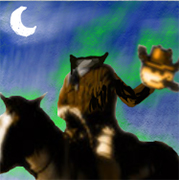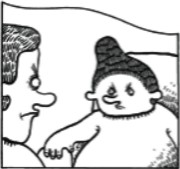|
I have no idea what I'm talking about here but in the spirit of  , who says they had to go hungry because they weren't eating the breeding stock and feed? Perhaps these things were developed during a time of plenty and they used excess to get started? , who says they had to go hungry because they weren't eating the breeding stock and feed? Perhaps these things were developed during a time of plenty and they used excess to get started?
|
|
|
|

|
| # ? May 12, 2024 23:35 |
Deteriorata posted:Göbekli Tepe directly contradicts that claim. It was a huge storehouse and ritual gathering site built by hunter/gatherers. There are numerous sites like it in Turkey and elsewhere.
|
|
|
|
|
There's a lot of gradient between sedentary and nomadic. Nomadic groups often have locations that they regularly like to revisit, even though technically if they ever need to they can use a different spot. There's plenty of records of Gauls and Germans migrating around in mass groups every so often (and after the fall of Rome, there was a time when groups formerly kept in place by Roman order roamed around again). The Haudenosaunee maintained consistent territory, but liked to move their villages around every 15-20 years to let trees regrow and soil to recharge. Some nomadic groups exist that go around within the territory of sedentary societies building a symbiotic relationship. Pastoralism often necessitates a level of nomad-ish behavior, since you need to move herds around to find new grasses for them to eat, and even today cattle ranching can involve moving all those cows long distances. We can only vaguely guess at what people thought when the development of agriculture was new, and there's a lot of generalization you have to make, and in theory, hunter/gatherer groups and nomads from later time periods may have had access to techniques that earlier groups didn't. There are plenty of historical culture clashes between groups with different styles of living, but there's still plenty of culture clashes between groups with identical economic models as well. And also studying native americans as a more documented form of hunter gatherer gets weird because most of them were a whole lot more sedentary before the Columbian plagues game.
|
|
|
SlothfulCobra posted:And also studying native americans as a more documented form of hunter gatherer gets weird because most of them were a whole lot more sedentary before the Columbian plagues game.
|
|
|
|
|
Wafflecopper posted:I have no idea what I'm talking about here but in the spirit of Yeah, there's some weird assumptions there which seem to be trying to apply moral judgements through hypotheticals. In general I feel like a lot of people have a hard time assuming that ancient humans actually could have a level of comfort and security rather than constantly desperate and starving. Agriculture and infrastructure require tons of experimentation, observation and effort that people presumed to be constantly living like refugees wouldn't have the time or energy to do.
|
|
|
|
Something to keep in mind is that any time someone tries to make a moral argument about a pre-agricultural society, you should prick your ears WAY up because it's really easy to get into some massive bullshit with that. More often than not the actual moral comparison is being done between this hypothetical ancient society and the modern one the author is living in. Sometimes its an unfavorable comparison: "Look at how barbaric these savages were, thank god for the light of civilization." Sometimes it's a favorable comparison in the "noble savage" framework: "look at how much more pure these simple folk are and how much stronger their connection to the land is." The latter is something that a lot of well meaning environmentalists fall into today trying to find a more "pure" society to compare our presumably fallen one to when it comes to stewardship of the land. So when I read the claim that in order to start farming you had to be a miser who didn't give a gently caress if your neighbor's kids were starving to death, I immediately start wondering if this is actually an analysis of the liminal space bet nomadism and sedentary societies, or if it's a backhanded critique of our modern world and, e.g. the existence of childhood hunger in a country that turns corn into gasoline for SUVs. Which to be clear is bad, but not, you know, because hunter gatherers are morally superior.
|
|
|
|
Yeah, all the evidence points to H/G societies ate very well and were excellent at time management of their food supplies. They knew what food was available where and when and planned their own migrations accordingly. They were very efficient at preparation and preservation and saving for the future was an integral part of it. Shifting to agriculture did not provide greater food security, and may have actually been worse in that regard. There were other factors at work than just food supply.
|
|
|
|
Deteriorata posted:Yeah, all the evidence points to H/G societies ate very well and were excellent at time management of their food supplies. They knew what food was available where and when and planned their own migrations accordingly. They were very efficient at preparation and preservation and saving for the future was an integral part of it. Having access to an unlimited pool of 2500 pound walking piles of steak is definitely easy-mode as far as hunting & gathering goes.
|
|
|
|
There are plenty of examples of foraging societies that clearly had issues with food security (being pushed into marginal land by agriculturalists didn't help in more modern examples, surely), and a number of examples (e.g. the Jomon) of groups that very clearly did not manage their environment effectively and ended up overexploiting it, leading to population decline. Foraging has been tried and tested more than the relatively young art of agriculture for sure but the lives of foraging societies ran the gamut too. After centuries of dismissal+often racist baggage it's kind of understandable why, but there's an irrationality/romanticism around how foragers get talked about lately that I think often doesn't seem to match up with the actual history. The tone of the passage I quoted definitely didn't help, I suppose.
|
|
|
|
Isn't the big reason to switch to agriculture it's higher production for a given unit of land so more people can live in a single place without migrating? I was under the impression hunter gatherer societies can get better food security in theory if you have unlimited productive land, but you're not always going to have a new area to migrate into once the population gets too big.
|
|
|
|
There are big complex weirs for storage of extra fish. It makes more sense to me that agriculture was a gradually enlarging share of human fodder over a relatively large swath of time than that it was a tech tree thing.
|
|
|
|
|
Koramei posted:
I don't know that it's a "lately" thing, you see lots of "noble savage" poo poo in the 19th century with it. There's this weird intersection where early environmentalists and early fascists were both super into these "pure, primitive" societies. One because of how they imagined them living more in tune with nature, the other because of how they imagined them having a closer connection to their racial homeland <insert blood and soil drivel here>.
|
|
|
|
Terrible Opinions posted:Isn't the big reason to switch to agriculture it's higher production for a given unit of land so more people can live in a single place without migrating? I was under the impression hunter gatherer societies can get better food security in theory if you have unlimited productive land, but you're not always going to have a new area to migrate into once the population gets too big. Keep in mind that this isn't an either/or thing. There are tons of examples of semi-agricultural peoples who farm in one area, move on to a winter camp, do some hunting and gathering in the off-season, etc. Lots of the native societies in eastern North America exhibit this around the time of colonization, for example, and I'm pretty sure it's still how a lot of the Amazonian groups do it today. By the same token, even fairly settled farming societies still tend to do a fair bit of hunting. Taking the reverse of the colonial America example above, pretty much any farmer on the frontier - no matter how settled and sedentary their society may be - were still taking a poo poo ton of game animals to supplement their fields. Broadly speaking farming does allow for larger surpluses, but a lot of that has to do with the domestication of animals and crops too. It's a big, complex equation without any clean and clear straight line progression where hunter/gather lifestyles are over here and urban living is over there.
|
|
|
|
poo poo my mom grew up hunting in the 1960s midwest because the animals they raised were too valuable for sale at market to be eaten by the people who raised them.Terrible Opinions posted:Isn't the big reason to switch to agriculture it's higher production for a given unit of land so more people can live in a single place without migrating? I was under the impression hunter gatherer societies can get better food security in theory if you have unlimited productive land, but you're not always going to have a new area to migrate into once the population gets too big. We don't really have any evidence that foraging societies ever really had infinite land anyway. All foraging societies we know of had neighbors - at the very least other foragers - and had negotiations and rules about who was allowed to use what land. Disputes over who used what land are a significant motivator in violence amongst foraging groups (who, whether or not you consider it "warfare," definitely do kill each other in regular, organized ways for political and economic goals). Foraging runs the gamut in a lot of ways. In principle, foraging as a mode of production will produce a better calorie ratio (the number of hours worked per x calories will be lower, but of course those "hours worked" can be expressed as calories, so it's a calories per calorie ratio), diversity of diet (and, downstream of that, health), and food stability (somewhat downstream of diversity of diet but related to some other factors as well). In principle. In practice, any of those may not be true of a given foraging society. And while foraging societies are generally much more resilient against events like droughts, storms, and blights, they are vulnerable in other ways not least of which being that, as it is an extensive mode of production like nomadic herding, other groups can destroy your food sources when you are weeks or months away from checking on them.
|
|
|
|
Tulip posted:poo poo my mom grew up hunting in the 1960s midwest because the animals they raised were too valuable for sale at market to be eaten by the people who raised them. hell, you can watch the show "chimp empire" on netflix to see two groups of chimps go to war over foraging territory
|
|
|
|
Why would you not call that Chimpire?
|
|
|
|
evilweasel posted:hell, you can watch the show "chimp empire" on netflix to see two groups of chimps go to war over foraging territory Thereís one on HBO called otter empire thatís this but narrated in an EXTREMELY trashy GoT-knockoff style. An otter at one point talks about how much watching her mate fight a snake makes her want to gently caress him. Another talks about wanting to drown her rival and watch the light go out in her eyes. I poo poo you not, shits amazing.
|
|
|
|
Tarka the Otter 2: With A Vengeance
|
|
|
|
Counterprpgramming Meerkat Manor with dark and edgy varmint videos is hilarious.
|
|
|
|
Tulip posted:poo poo my mom grew up hunting in the 1960s midwest because the animals they raised were too valuable for sale at market to be eaten by the people who raised them. Thatís still a thing. A pound of deer means a pound of beef can be sold instead.
|
|
|
Cyrano4747 posted:Thereís one on HBO called otter empire thatís this but narrated in an EXTREMELY trashy GoT-knockoff style.
|
|
|
|
|
Nessus posted:Is this like furry animated stuff or is it narration over nature videos? Sounds like someone got someone to invest in making their fetish. Not thatís thereís anything wrong with that.
|
|
|
|
Nessus posted:Is this like furry animated stuff or is it narration over nature videos? Actual nature footage, apparently, but with adult-comedy voiceovers instead of David Attenborough.
|
|
|
|
Bar Ran Dun posted:Thatís still a thing. A pound of deer means a pound of beef can be sold instead. It's also a lot easier to slaughter domesticated livestock at a proper facility at your leisure rather than a wild animal.
|
|
|
|
Kylaer posted:Actual nature footage, apparently, but with adult-comedy voiceovers instead of David Attenborough. Yep, it's filmed 100% straight like it's a nature documentary, but then they handed the voiceover work off to out-of-work GoT writers and the hammiest VO actors they could find.
|
|
|
|
Ah, like Plizzanet Earth.
|
|
|
|
|
What's the point of a nature documentary not voiced over by David Attenborough?
|
|
|
|
Cyrano4747 posted:Yep, it's filmed 100% straight like it's a nature documentary, but then they handed the voiceover work off to out-of-work GoT writers and the hammiest VO actors they could find. Honestly I was expecting a campy reference to Lu Bu or something
|
|
|
|
Finished listening to an audiobook on youtube of Caesars Commentaries on the Gallic Wars. It's pretty amazing, to have such a detailed piece of work from that time. It reads like a current story from a war correspondent, but its stuff that happened before Jesus. Caesar transports you back in time and puts you right there. It's interesting to hear all the quirky cultural practices among the different tribes.
|
|
|
|
ChocNitty posted:
Take this with a huuuuuuuge grain of salt. I mean, some of it is probably totally legit, but this was also basically propaganda written by a politician for a specific reason, and that reason was impressing the folks back home and aggrandizing himself. So when he describes some quirky cultural practice it might be exactly as he saw it, he might be embellishing it for a specific reason, or it might be made up entirely. Why would someone do this? To add color to the account, to conform to some traditional moral or structure of Roman story telling, or for some other reason that is opaque to us because it relies on the reader being steeped in the same 1st century BC Imperial culture as Caesar. I mean, all that stands for the rest of the text, not just the weird little cultural flourishes. It's important to remember that this isn't a neutral observer or reporter, it's a dude writing for a political purpose. It would be kind of like writing a history of World War 2 based only on what was published in Pravda.
|
|
|
|
ChocNitty posted:Finished listening to an audiobook on youtube of Caesars Commentaries on the Gallic Wars. link?
|
|
|
|
https://twitter.com/ahistoryinart/status/1673721793683636226?s=20 The Romans ate a sort of pizza apparently.
|
|
|
|
That just looks like a flatbread with stuff on top of it. So, uh, I guess?
|
|
|
|
What would the red things that look like either tomato or peppers be?
|
|
|
|
Hippocrass posted:What would the red things that look like either tomato or peppers be? Figs maybe?
|
|
|
|
Syncopated posted:https://twitter.com/ahistoryinart/status/1673721793683636226?s=20 If that's pizza so is Flammenkuchen, lahmacun, and pide, and that's not even getting into the world of poo poo like tortillas and injera. Which is to say that no, it's not pizza. It's just a bread that people put things on. edit: by this logic tamales and perogi are basically the same as calzone.
|
|
|
|
Cyrano4747 posted:If that's pizza so is Flammenkuchen, lahmacun, and pide, and that's not even getting into the world of poo poo like tortillas and injera. I mean, your logic here is kinda poor because it ignores that they're calling a "distant ancestor" of pizza and unlike the stuff you're talking about it comes from the same part of what is now Italy that pizza does.
|
|
|
|
skasion posted:Figs maybe? Or dates? Could also be shellfish of some sort. Mussels are often red. Cyrano4747 posted:If that's pizza so is Flammenkuchen, lahmacun, and pide, and that's not even getting into the world of poo poo like tortillas and injera. But is it a sandwich?
|
|
|
|
Cyrano4747 posted:If that's pizza so is Flammenkuchen, lahmacun, and pide, and that's not even getting into the world of poo poo like tortillas and injera. Corn or potato does not make a calzone. Iíve never had a ďpizzaĒ with an alternative crust beside those gluten free ones. Also you boil as opposed to bake tamales. So basically nothing like calzone.
|
|
|
|

|
| # ? May 12, 2024 23:35 |
|
Vincent Van Goatse posted:I mean, your logic here is kinda poor because it ignores that they're calling a "distant ancestor" of pizza and unlike the stuff you're talking about it comes from the same part of what is now Italy that pizza does. It's a distant ancestor of pizza, like flat bread with stuff on it is a distant ancestor of pizza. It's interesting, but the presentation in the article is dumb.
|
|
|















































